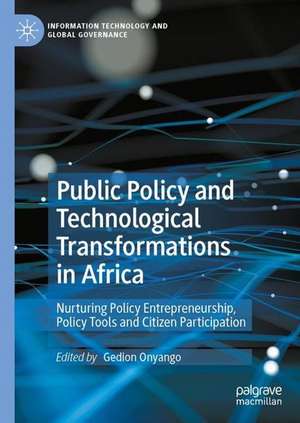Public Policy and Technological Transformations in Africa: Nurturing Policy Entrepreneurship, Policy Tools and Citizen Participation: Information Technology and Global Governance
Editat de Gedion Onyangoen Limba Engleză Hardback – aug 2023
Preț: 790.28 lei
Preț vechi: 963.76 lei
-18% Nou
Puncte Express: 1185
Preț estimativ în valută:
151.23€ • 161.71$ • 126.08£
151.23€ • 161.71$ • 126.08£
Carte tipărită la comandă
Livrare economică 17 aprilie-01 mai
Preluare comenzi: 021 569.72.76
Specificații
ISBN-13: 9783031187032
ISBN-10: 3031187032
Pagini: 417
Ilustrații: XXVI, 417 p. 43 illus.
Dimensiuni: 148 x 210 mm
Greutate: 0.68 kg
Ediția:1st ed. 2023
Editura: Springer International Publishing
Colecția Palgrave Macmillan
Seria Information Technology and Global Governance
Locul publicării:Cham, Switzerland
ISBN-10: 3031187032
Pagini: 417
Ilustrații: XXVI, 417 p. 43 illus.
Dimensiuni: 148 x 210 mm
Greutate: 0.68 kg
Ediția:1st ed. 2023
Editura: Springer International Publishing
Colecția Palgrave Macmillan
Seria Information Technology and Global Governance
Locul publicării:Cham, Switzerland
Cuprins
Chapter 1: Crafting Policy Technologies (PolicyTechs) from FinTechs, CivicTechs, GovTechs: An Introduction.- Part 1: TECHNOLOGIES AS PUBLIC POLICY TOOLS AND VENUES.- Chapter 2: State Entrepreneurship in Africa: Realising digital transformation for Policy effectiveness in selected countries.- Chapter 3: Technological Leapfrogging and Innovation: Re-Imagining Evaluation Approaches and Practice in Africa.- Chapter 4: Digital Technologies, Data Commons and Rights in Africa: The Case of DigitalTransport4Africa.- Chapter 5: Biometric turn and the quest of public interest. Assessing the National Identification policy in Cameroon.- Chapter 6: Digital Participatory Budgeting and Policymaking in Botswana.- Part 2: TECHNOLOGIES NURTURING POLICY ENTREPRENEURSHIP AND PEFORMANCE.- Chapter 7: The Digital Economy and Youth Employment in Africa.- Chapter 8: Digitalisation of agricultural policy and policy performance in Tanzania.- Chapter 9: Information Technology, The Complexity of Joint Action, and Child Protection Policy implementation in Kenya.- Chapter 10: Mobilising and Securing Private Financial Flows from Digital Business Platforms and Curbing Tech Enabled IFFs to Finance SDGs in Africa.- Part 3: TECHNOLOGIES AS SPACES FOR CITIZEN PARTICIPATION.- Chapter 11: Strengthening citizen agencies in policymaking through Social media.- Chapter 12: Social media and public policymaking in Southern Africa.- Chapter 13: Technology-mediated Transparency, Accountability, and Participation in the realisation of Citizen-centred Health Interventions: Case Study of MobiSAfAIDS in Southern Africa.- Chapter 14: Digitalising Decentralisation Policy across regions in Africa.- Part 4: EMERGING CHALLENGES.- Chapter 15: Regulatory issues for the promotion of entrepreneurship in electronic money in the CEMAC sub-region.- Chapter 16: Ethical dilemmas in Public Innovations and ICT solutions during COVID-19 in Kenya.
Notă biografică
Gedion Onyango is a Researcher at the Firoz Lalji Institute for Africa, London School of Economics and Political Science, UK.
Textul de pe ultima copertă
This is a hands-on volume that develops insightful analysis and frameworks for understanding the roles of various electronic and digital products in Africa’s transformation.
-Eric E. Otenyo, Professor, Northern Arizona University, United States
In light of technologically driven revolutions that are already taking place in Africa, this book is an important source of policy insights.
-Artwell Nhemachena, Research Fellow, University of South Africa, South Africa
Through empirically grounded analysis, authors provide an uncommon window into how African states are leveraging 4IR technologies.
-E. Remi Aiyede, Professor, University of Ibadan, Nigeria
This book is highly recommended for anyone who wants to know what is at stake, what has recently been done in Africa, and how to proceed from here.
-Nitesh Bharosa, Academic Director, Digicampus, the Netherlands
This book examines the links between public policy and Fourth Industrial Revolution (4IR) technological developments in Africa. It broadly assesses three key areas – policy entrepreneurship, policy tools and citizen participation – in order to better understand the interfaces between public policy and technological transformations in African countries. The book presents incisive case studies on topics including AI policies, mobile money, e-budgeting, digital economy, digital agriculture and digital ethical dilemmas in order to illuminate technological proliferation in African policy systems. Its analysis considers the broader contexts of African state politics and governance. It will appeal to students, instructors, researchers and practitioners interested in governance and digital transformations in developing countries.
-Eric E. Otenyo, Professor, Northern Arizona University, United States
In light of technologically driven revolutions that are already taking place in Africa, this book is an important source of policy insights.
-Artwell Nhemachena, Research Fellow, University of South Africa, South Africa
Through empirically grounded analysis, authors provide an uncommon window into how African states are leveraging 4IR technologies.
-E. Remi Aiyede, Professor, University of Ibadan, Nigeria
This book is highly recommended for anyone who wants to know what is at stake, what has recently been done in Africa, and how to proceed from here.
-Nitesh Bharosa, Academic Director, Digicampus, the Netherlands
This book examines the links between public policy and Fourth Industrial Revolution (4IR) technological developments in Africa. It broadly assesses three key areas – policy entrepreneurship, policy tools and citizen participation – in order to better understand the interfaces between public policy and technological transformations in African countries. The book presents incisive case studies on topics including AI policies, mobile money, e-budgeting, digital economy, digital agriculture and digital ethical dilemmas in order to illuminate technological proliferation in African policy systems. Its analysis considers the broader contexts of African state politics and governance. It will appeal to students, instructors, researchers and practitioners interested in governance and digital transformations in developing countries.
Gedion Onyango is a Researcher at the Firoz Lalji Institute for Africa, London School of Economics and Political Science, UK.
Caracteristici
Examines digital technologies used by governments and policy actors to improve public policy effectiveness Presents comparative analyses on how policy actors leverage digital technologies for public policy Fills an important gap in the current understanding of public policy and technology in Africa













